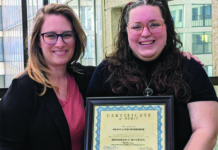by Johanna Black
Upon entering college, young people are often presented with a myriad of real world issues that they may have never experienced before. A growth in freedom and independence, a higher level of education and professionalism, and with it a huge increase in personal and social responsibility may become progressively and sometimes painfully apparent.
As the fragile shell of naivety and innocence built under the protective care of their guardians shatters, negative aspects in basic areas of life start to become highlighted.
Sexual health is one of the top issues that students and young adults face at this time in their lives. According to the U.S. Department of Health and Human Services, Americans ages 15 to 24 account for 50 percent of the 20 million new sexually transmitted infections in the United States each year. Many do not know they are infected because Sexually Transmitted Infections (STI) often present no symptoms. Not only can addressing this issue be difficult for young adults, preventative and ongoing treatment and care can be challenging to locate and access.
Two of the more serious and potentially fatal diseases contracted sexually and through the use of intravenous drugs are Human Immunodeficiency Virus (HIV) and Hepatitis C. Both diseases attack the body and can be fatal.
HIV attacks the immune system leaving the body defenseless to other fatal viruses and bacteria while Hepatitis C attacks the liver preventing it from breaking down toxins and producing proteins needed for the body to function. HIV and Hep C are both spread through blood-to-blood contact with HIV, along with being spread through other bodily fluids such as semen.
Western Colorado AIDS Project offers free services to anyone who has had more than one sexual partner in the last year including but not limited to men, women and the LGBTQ community. These services include free rapid response HIV and Hepatitis C testing, referrals for free Chlamydia, Gonorrhea and Syphilis testing, and linkage to treatment and care.
WestCAP covers the 40,000 square miles west of Frisco in the state of Colorado and reports about two new HIV positive cases per month. Not only does WestCAP offer free harm reduction supplies such as condoms, lubricant and dental dams, they provide free injection kits and sharps containers through their legal syringe exchange.
The Center for Disease Control and Prevention reports that more than 1.2 million people are living with HIV in the United States and one out of eight of them do not know that they are infected.
Although the percentage of HIV positivity has declined in the past 10 years and there has been a significant increase and progress in medical treatment and preventative care, HIV still results in a large amount of deaths and has the potential to lead to Acquired Immunodeficiency Syndrome (AIDs) if left untreated. After the diagnoses of AIDs, the possibility of death increases considerably.
According to Jeff Basinger, Director of Regional Programs at WestCAP, Colorado was one of the first states to integrate care and prevention. With the increase of education and preventative care, the state of Colorado hopes to generate a decline in the amount of HIV positive cases each year to eventually lead to no new cases by the year of 2030.
Shannon Robinson, the prevention services manager, suggests that all young adults get screened at least once a year and to always know their status so as to not potentially further harm themselves or their partners.
“Know your status for all STIs, come talk to a harm reduction specialist here, get screened at least once a year, [and] with each new partner add a test,” Robinson said.
WestCAP will host an open house to show the community their new home on World AIDS Day on Dec. 1 and is now located at 2352 North 7th St., at the entrance in the back.





